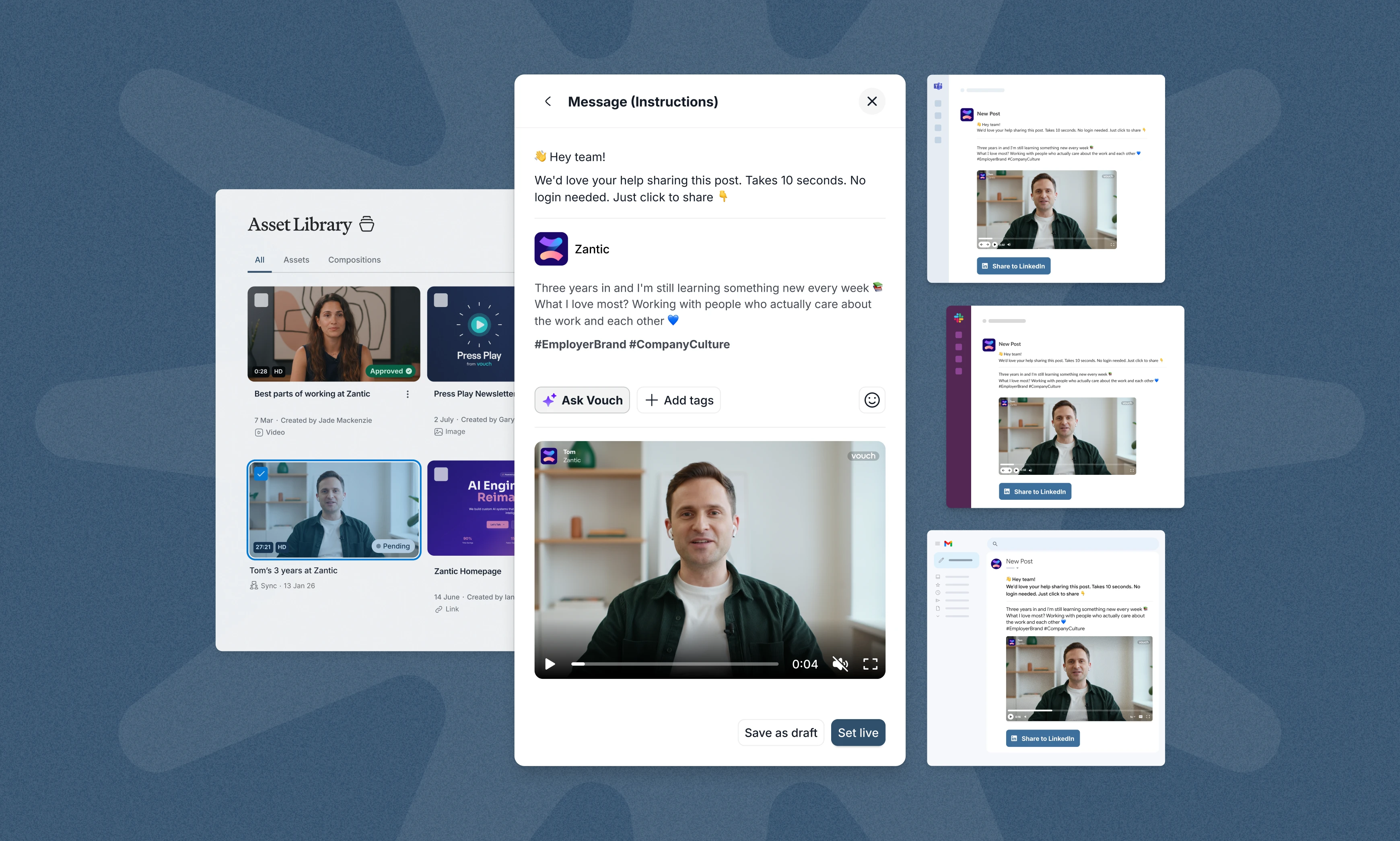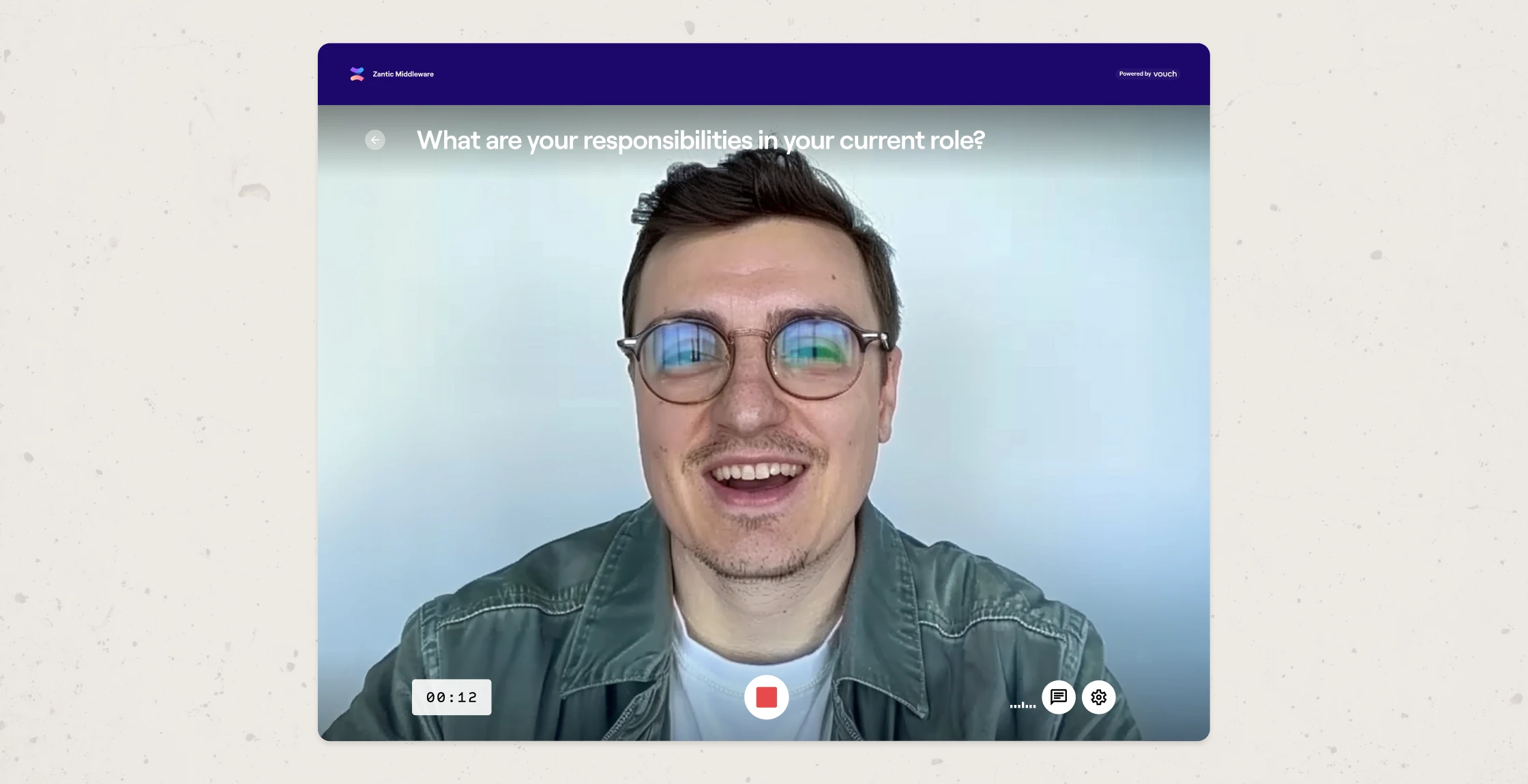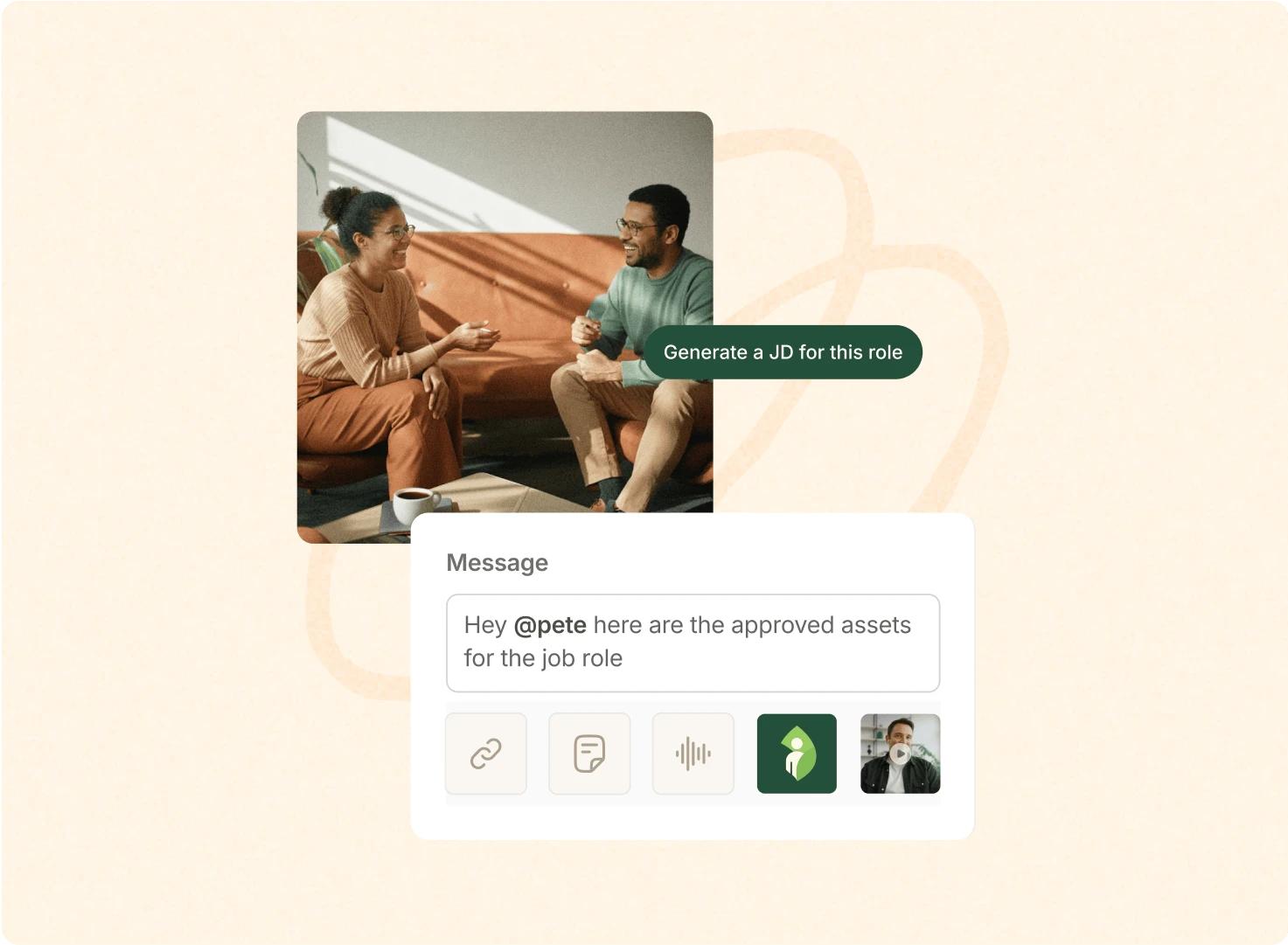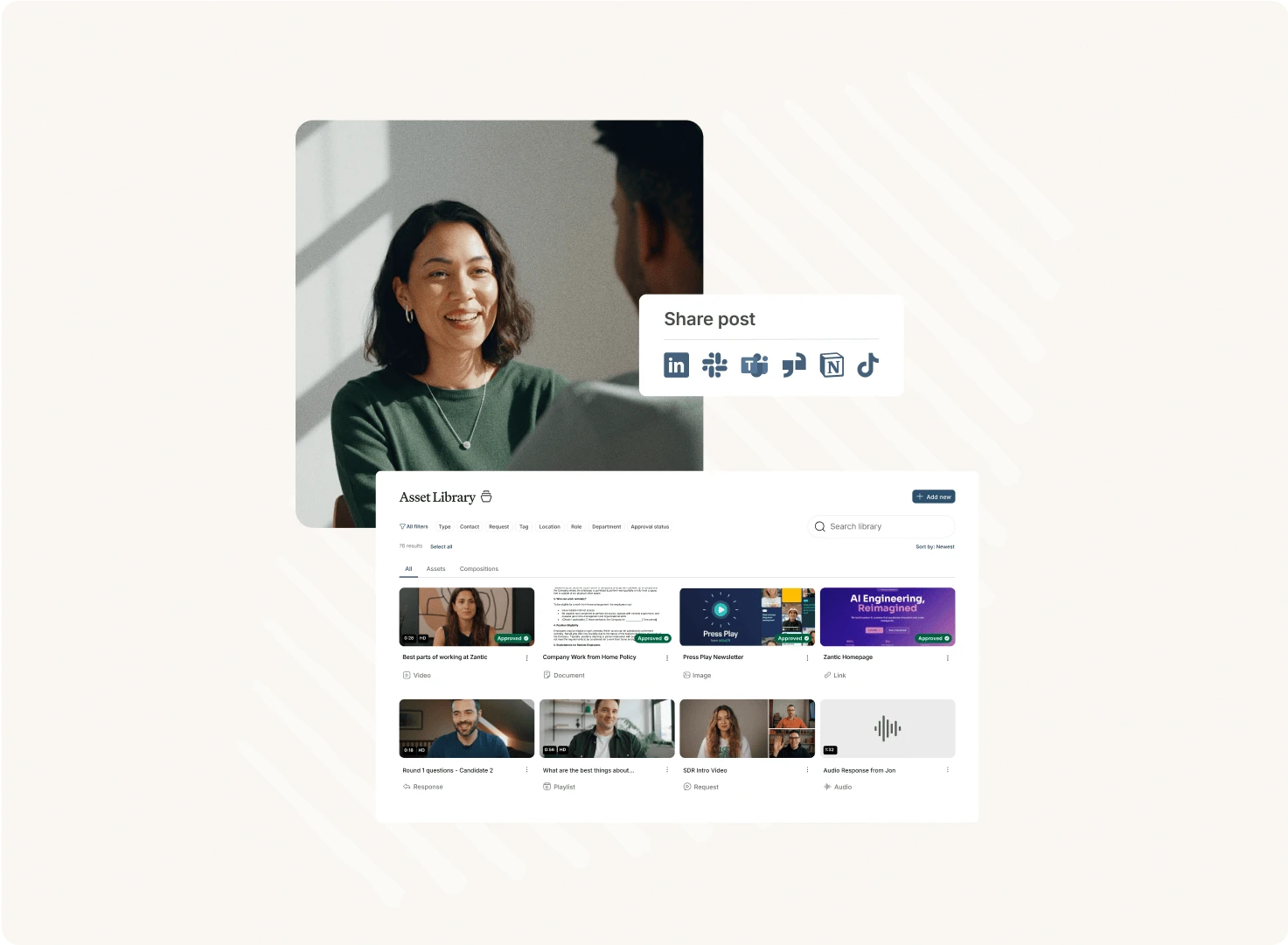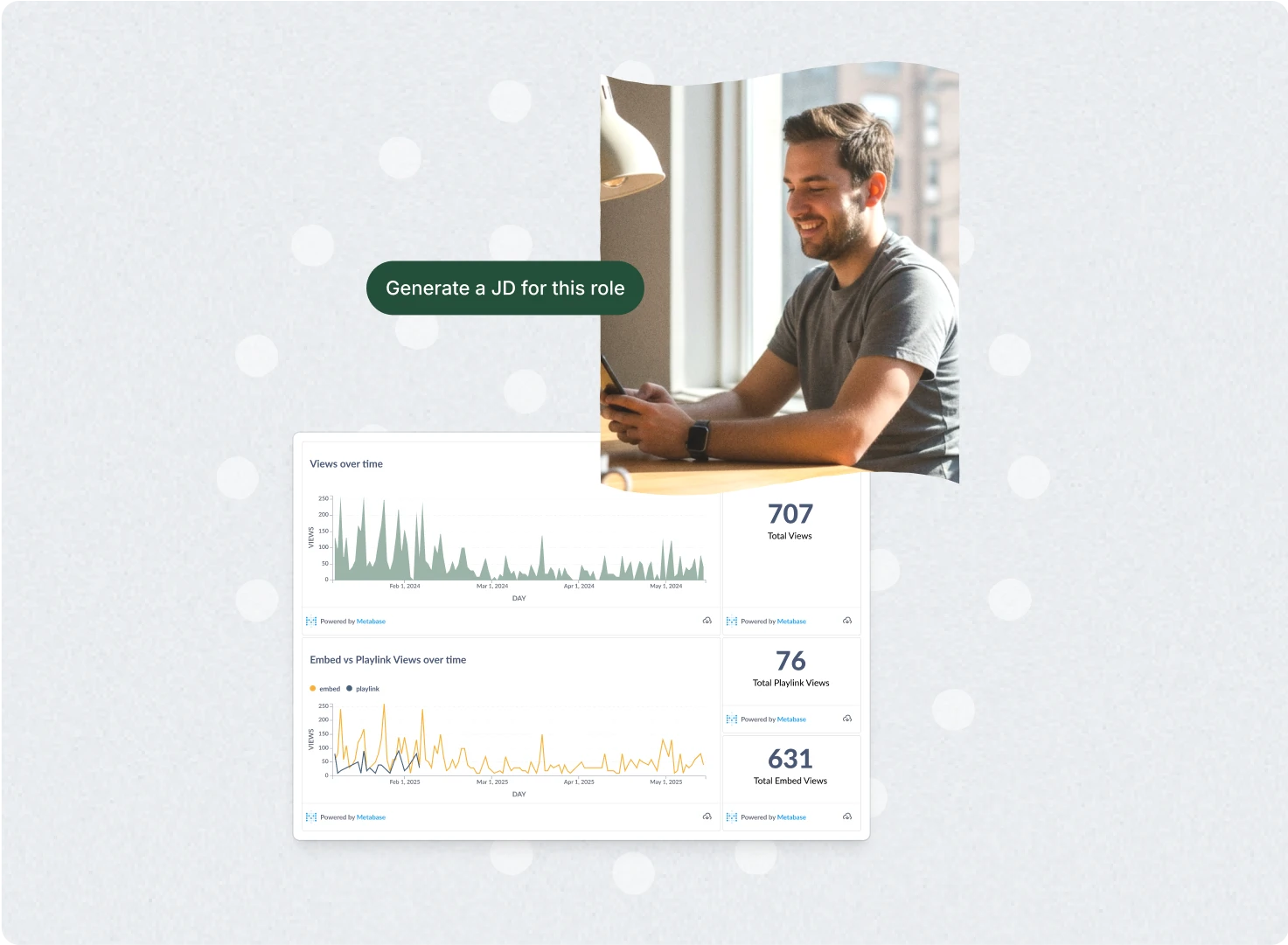In 2026, a lot of HR teams are looking for ways to streamline their hiring processes and, at the same time, improve the candidate experience.
To help speed up hiring, one-way interviews, also known as pre-recorded interviews or video screenings, have emerged as a popular solution, famously used by supermarket giant Aldi and lots of other companies around the world.
But what exactly is a one-way interview?
Let's dive in.
What is a One-Way Video Interview exactly?
One-way video interviews are an innovative approach to screening candidates and offer many benefits for companies of all sizes.
These kinds of interviews are also perfect for tech-savvy and younger job seekers.
By conducting one-way interviews, you can simultaneously screen multiple candidates, broaden your candidate pool by including remote applicants, and evaluate candidates' technological skills all at the same time.
As technology plays an increasingly prominent role in the hiring process, one-way interviews have become an indispensable tool, famously used by companies like Aldi supermarkets (you can YouTube it).
A one-way video interview, also known as an asynchronous interview or online interview, is a pre-screening tool used by employers to determine if a candidate should progress to the next round of interviews.
Instead of talking personally to every candidate, which takes immense time, candidates see written questions on their computer screens, record, and submit their answers using their computer's camera or mobile device.
You can then review the applicant's video and decide whether to schedule the candidate for a further interview. This tech and type of interview allows for flexibility and convenience for both the candidate and the employer.
Why Do Companies Use One-Way Video Interviews?
Saving time is naturally one of the biggest benefits. Still, HR teams and recruitment companies are now using one-way video interviews as they provide lots of advantages over traditional two-way interviews.
Firstly, these interviews let you efficiently screen multiple candidates simultaneously, eliminating scheduling conflicts and saving time for your HR department, supervisors, and other team members involved in the hiring process.
One-way video interviews can also widen your candidate pool by removing geographical restrictions and time zones. Remote candidates can now participate in the interview process without the need for costly and time-consuming travel or waking up at 2am, which is never the best time for a job interview!
One-way video interviews also let you quickly gauge a candidate's technical abilities and proficiency, for example, evaluating someone's coding capabilities or content writing abilities.
One-way video interviews also remove biasing, which is important in 2026 to enhance the focus on diversity and inclusion in your workforce.
The AI-enabled workspace for talent teams.
- Unified workspace for talent teams
- Accelerate hiring with AI tools
- Auto-generate polished hiring and employer brand content
- Easily repurpose assets across all channel
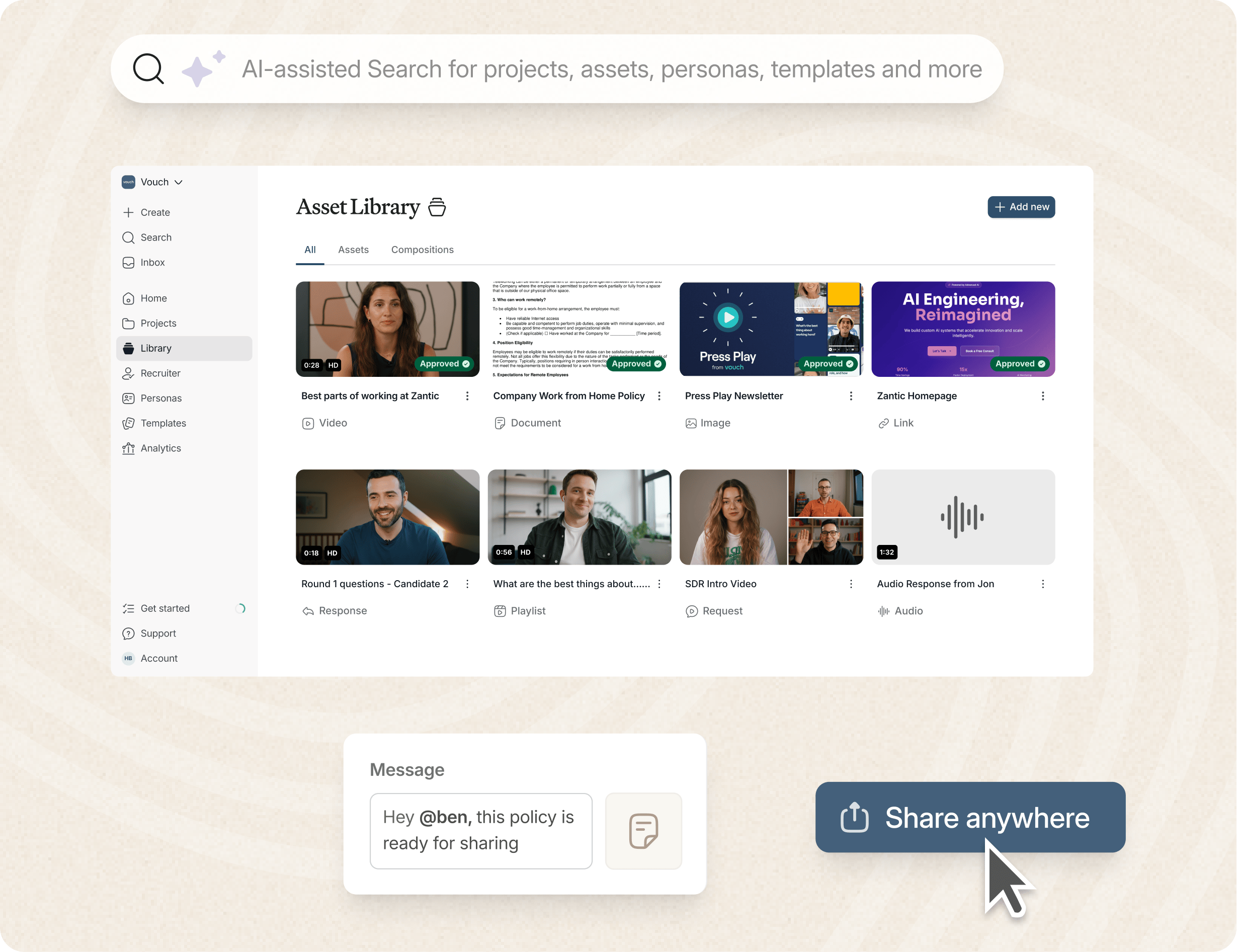
How Does a One-Way Video Interview Work?
In general, candidates participate in a one-way video interview as part of their initial application process - it's usually the first round.
Once logged into your portal (Vouch provides enterprise-level security), candidates can go through a practice round of recording and get plenty of time, which familiarizes them with the interview format and allows them to test their equipment.
During the actual recorded interview (once they are ready to go), candidates are presented with a series of questions on their screen and record their answers using their computer's camera or mobile device's phone screens.
The interview format may vary depending on your desired process. Still, candidates are typically given a time limit or amount of time to respond to each question and overall interview to make sure it's easy for you to review.
Once all the questions have been answered on the one-way video interview platform, the candidate can submit their application.
One-way video interview software streamlines the initial screening stage, allowing you to evaluate candidates' qualifications and fit for the position efficiently. It also provides candidates with a convenient and accessible way to showcase their skills and experiences.
By recording their responses, your candidates can carefully tailor their answers to highlight their strengths and effectively communicate their qualifications, even without direct interaction with interviewers.
Additionally, the practice round of having a virtual interview gives candidates the opportunity to familiarize themselves with the interview platform, ensuring a smoother experience during the actual interview.
Overall, the one-way video interview process simplifies the application and initial screening process for both employers and candidates, providing a convenient and effective way to assess candidates' suitability for the position.
How Do One-Way Interview Questions and Answers Work?
When participating in a one-way video interview, applicants will be presented with a set of predetermined questions they need to answer - which you set. These questions are designed to assess a candidate's qualifications, experience, and fit with the company's values and goals.
The best part is that you get to set the questions, or with Vouch, you can use some of our templates to make the process even easier.
But no matter how you set the questions to best screen candidates, it's important to prepare concise and tailored answers for each question. Take the time to make sure candidates can highlight their relevant qualifications, share examples from their experience, and emphasize how their skills align with your company's needs.
In other words, getting your questions right is everything!
What Are The Pros and Cons of One-Way Video Interviews?
One-way video interviews have both advantages and disadvantages in the hiring process. Understanding these pros and cons can help you make an informed decision about incorporating this interviewing method into your recruitment strategy.
The Advantages
1. Flexibility for both recruiters and candidates
One-way video interviews provide the flexibility for recruiters to review candidate submissions at their convenience, saving time and reducing scheduling conflicts. Candidates also have the flexibility to complete the interview at their preferred time, accommodating their schedule.
2. Accommodation for remote candidates
With one-way video interviews, companies can screen and evaluate candidates from anywhere in the world, eliminating the geographical restrictions of two-way video interviews. This enables companies to broaden their candidate pool and consider talent that might have been inaccessible in traditional interview formats.
3. Ideal baseline for comparing candidates
One-way video interviews provide a standardized format for evaluating candidates - there are no interview deviations. By asking the same set of predetermined questions, recruiters can compare responses and assess candidates on an equal basis, facilitating a fair and objective evaluation.
For many larger companies that focus on diversity and inclusion, digital technologies can help make sure biasing is removed.
4. Collaboration in the decision-making process
One-way video interviews allow multiple stakeholders, such as hiring managers and team members, to review candidate submissions and provide input. This collaborative approach helps enhance the decision-making process and ensures a comprehensive evaluation of candidates.
The Disadvantages Of One-Way Interviews
1. Lack of human connection
One of the drawbacks of one-way video interviews is the absence of face-to-face interaction. This can make it challenging for candidates to establish a rapport with the interviewer and showcase their personality and interpersonal skills. Of course, every applicant is on the same playing field, so this can go either way.
2. Inability to promote the company
During a one-way video interview, candidates miss the opportunity to learn more about the company's culture, environment, and values. This limitation can hinder their ability to demonstrate enthusiasm and alignment with the organization. One of the biggest kickbacks from Aldi's one-way interviews is the lack of interaction. However, most applicants have likely shopped at an Aldi store, so they do have a sense of the company and roles.
3. Technological barriers
Not all candidates may be comfortable or proficient with technology. Candidates who are not tech-savvy may experience difficulties in navigating the video interviewing platform, affecting their performance and potentially excluding them from consideration.
Vouch is remarkably easy to use, so if you are interviewing for a lower-tech role, then we think Vouch will cater to everyone. Please see here: Vouch for recruitment.
4. Lack of organic conversation
Unlike traditional interviews, one-way video interviews lack the spontaneity of organic conversation. This can make it challenging for candidates to showcase their communication skills and adapt to unexpected questions or follow-up discussions. Of course, this can also be an advantage, especially in technical roles where less qualified people may be better at selling themselves but less qualified for the role. It really depends on your needs.
Considering the advantages and disadvantages of one-way video interviews is essential to optimize your hiring process. Balancing the convenience and efficiency of this interviewing method with the need for human connection and a comprehensive candidate evaluation will help you make informed decisions and select the best candidates for your organization.
What Guides Can You Give Candidates For Their One-Way Interviews?
To help your candidate make the most out of a one-way video interview, you should always send them tips on the best practices. These practices will help them present in the best possible way and increase their chances of moving forward in the hiring process.
Record in the right environment
Before starting the interview, make sure candidates know how to prepare their environments. Find a quiet and well-lit location with minimal background noise where they won't be disturbed. Ask them to remove any potential distractions from their backgrounds and ensure that the lighting and sound quality are optimal. This will help create a professional and focused atmosphere that is not distractive for you.
Think through each question
For one-way video interviews, we always recommend giving candidates a practice session where they can run through the interview before recording their real take. Recommend that they have time to think through each question before recording their response. Reflect on the questions, gather their thoughts, and structure each answer in a clear and concise manner. This will help you review a well-thought-out response that demonstrates their ability to communicate effectively.
Practice their answers
As mentioned, before starting the actual interview, it's beneficial for candidates to practice their answers. Keep in mind that your candidates may never have recorded themselves on video before. Practice will help them feel more confident and comfortable during the recording process and be able to expand their abilities for your job description and needs.
By following these best practices, your candidates can make a positive impression during their one-way video interviews. Remember to guide them on basic things, too, like maintaining eye contact, being aware of body language and tone of voice, dressing professionally, preparing their environment, etc. These steps will help your candidates best present themselves and increase their chances of success in your hiring process - just like in an in-person interview.
What Are The One-Way Video Interview Benefits For Candidates?
Participating in a one-way video interview offers several advantages for your candidates, too.
One of the greatest benefits of a one-way video interview is the opportunity for candidates to showcase their best selves. Unlike in a traditional interview, they have the advantage of controlling the environment and recording their responses in a controlled and prepared manner. This allows candidates to carefully craft their answers, highlighting their skills, experiences, and qualifications effectively - without feeling like they are being "put on the spot."
Additionally, one-way video interviews enable job seekers to have a video resume on file, which is ideal to match them later with future opportunities that align perfectly with their skills and qualifications.
FAQs
Why do companies use one-way interviews?
Companies use one-way interviews as a pre-screening tool in the hiring process. It allows them to evaluate candidates before scheduling in-person interviews.
What is a one-way video interview?
A one-way video interview is a pre-screening tool where candidates see written questions on their computer screen and record and submit their answers using their computer's camera or mobile device.
Why do employers use one-way video interviews?
Employers use one-way video interviews to screen multiple candidates simultaneously, widen the candidate pool by accommodating remote applicants, and assess technological skills.
How does a one-way video interview work?
Candidates complete the one-way video interview as part of their initial application. They log into the application and go through a practice round before answering the actual questions.
What are the pros and cons of one-way video interviews?
The advantages of one-way video interviews include flexibility, time-saving benefits, and the ability to screen multiple candidates. The disadvantages include the lack of human connection and the inability to promote the company.
What are the best practices for one-way video interviews?
Best practices include:
- Maintaining eye contact with the camera.
- Dressing professionally.
- Preparing the environment.
- Practicing answers to questions beforehand.
What are the benefits of participating in a one-way video interview?
Participating in a one-way video interview provides a faster approval process and the opportunity for candidates to present their best selves. It also allows recruiters to match candidates with relevant opportunities.
What challenges may candidates face in one-way video interviews?
Candidates may face challenges in building rapport and showcasing interpersonal skills due to the lack of human connection. However, companies can mitigate these by providing other opportunities for personal interactions.
What are the benefits and best practices for conducting one-way interviews?
One-way interviews offer benefits such as flexibility, time savings, and the ability to screen multiple candidates. Best practices include being prepared, maintaining professionalism, and creating a positive candidate experience.
Summary: Leveraging One-Way Video Interviews
One-way video interviews have their advantages and disadvantages, with the main challenge being a lack of human connection, which can make potential candidates feel undervalued during the recruiting process.
Additionally, candidates with strong communication and relationship-building skills may struggle to showcase these abilities in one-way video interviews. But for many companies, this is a positive as it puts everyone on the same playing field and removes many biases to ensure your company is focusing on diversity and inclusion.
All up, though, there is no question that one-way recorded video interviews are the future and are preferred by younger generations.
The only real way to see if it is suitable for your company and HR team is to try it for a job opening. You can quickly gauge if video interviews help.
Tools like Vouch also make one-way video interviews remarkably easy, helping you streamline your recruitment and screening process and focus on the most qualified candidates without bias.
Vouch Makes One-Way Video Interviews Easy
Loved by companies like Canva, Nike, Cisco, HubSpot, Amazon, and more, tools like Vouch make leveraging video in your business remarkably easy.
Be sure to book a Vouch demo today and chat with a video content expert.
You might also like

Elevate Your Brand Today With Vouch
Discover how Vouch can accelerate talent acquisition while helping you stay on-brand.

